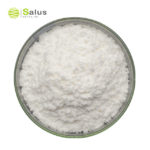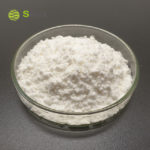
86-29-63699260 / +86-137-5995-3739

Sale@salusnutra.com


Product Name: Gamma Polyglutamic Acid
CAS Number: 25513-46-6
EINECS No: 200-293-7
Empirical Formula (Hill Notation): L-Glu-(L-Glu)n-L-Glu
Package:25Kg/Drum
Drum’s Size:36cm*36cm*52cm
Shelf Time:2 Years
Description
PGA is a water soluble, biodegradable, non-toxic biopolymer produced by microbial fermentation.
PGA is a sticky material first found in “natto”, a fermented soybean.PGA is an unusual anionic, naturally occurring homo polyamide that is made of D & L glutamic acid units connected by amide linkages between alpha amino & gamma carboxylic acid groups.
Gamma-poly-glutamic acid (gamma-PGA) is a natural occurring, multi-functional, and biodegradable biopolymer. It is produced through fermentation by Bacillus subtilis using glutamic acid. PGA is consists of glutamic acid monomers crosslinked between α-amino and γ-carboxyl groups, and the molecular weight of PGA is usually between 100~1000 kDa. It is water-soluble, edible and non-toxictowards human, and is environment friendly. It has broad applications in the fields of medicine, food, cosmetics, and water treatment.
We can Provide you PGA as bellowed specification:
Specification
|
Type |
Molecular weight |
Assay |
|
Quite High Molecular Weight |
≥2000000 Da |
≥99.8% |
|
High Molecular Weight |
≥1000000 Da |
≥99.8% |
|
Middle Molecular Weight |
≥700000 Da |
≥99.8% |
|
Low Molecular Weight |
≤100000 Da |
≥99.8% |
|
Quite Low Molecular Weight |
≤10000 Da |
≥99.8% |
PGA is chemically considered a protein, and much like hyaluronic acid, it also is naturally occurring within your skin, so it falls right in line with the philosophy of “help your skin do what it does” that I’ve really been sticking to lately. What makes it different is that, according to studies, PGA can hold more water than hyaluronic acid can. You always hear that hyaluronic acid can hold 1,000 times its weight in water, and apparently PGA can hold five times that. Obviously that won’t translate exactly on to your skin, but the point is, it can pack a punch when it comes to hydration.
However, PGA is a chunkier molecule than hyaluronic acid, so it doesn’t have the potential to sink as deeply into the skin as hyaluronic acid can. With “multiple weights of hyaluronic acid” being an extremely trendy marketing thing right now, the inability to penetrate into deeper layers of skin might seem like a negative, but the fact that PGA is a bigger molecule could be beneficial.
Sitting in the upper portion of your skin means that PGA will help give that classic “glass skin” type of look. The surface hydration is what aids in making your skin look dewy and plump, which can minimize the appearance of fine lines and pores. I really appreciate this type of effect because I’ve found that keeping my skin full of hydration actually does make my pores look less apparent, which is a battle I will be fighting for the rest of my life.
These different qualities actually makes PGA quite a great companion to hyaluronic acid, which is why I was irritated that my initial research into this ingredient turned up so many articles talking about how PGA is going to give hyaluronic acid a “run for its money” or that hyaluronic acid can “move over,” implying that PGA is superior because it has the potential to hold more water. Even the articles making these statements acknowledge that PGA is not a direct replacement for hyaluronic acid, but actually discuss how the two could potentially work very well together, which I am in full agreement with, so the fact that they’re making these “PGA > HA” statements in both their content and even in their titles really is incredibly annoying.
I’m actually quite intrigued by the early research on PGA, and I expect it to creep its way into more hydrating toners and serums during the upcoming year despite being not so thrilled with how some corners of the internet are choosing to discuss it. My message to you is this: PGA could be great, so give it a try if you get the chance, consult a derm if you have skin conditions that can make fermented ingredients difficult to tolerate, and make sure you read the whole article, not just the headline, because sometimes they literally disagree with each other. I promise that won’t happen here.

Send Message +
© 2021 www.salusnutra.com All Rights Reserve